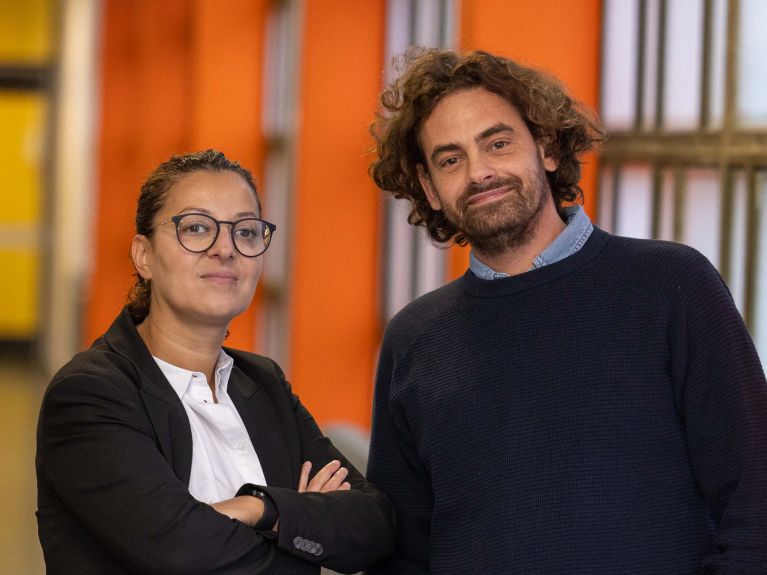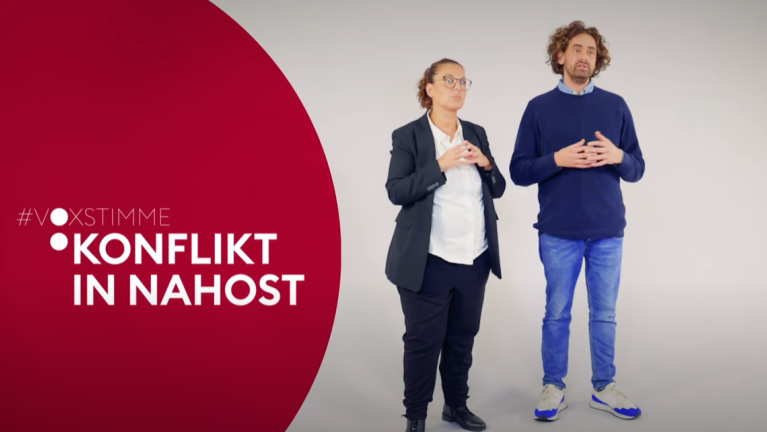“Discussing fears without prejudice”
The Middle East conflict can be a polarising issue in schools. Jouanna Hassoun and Shai Hoffmann are creating spaces in schools to talk about facts and discuss opinions.

The Palestinian German Jouanna Hassoun and Israeli German Shai Hoffmann have been working together since 2020 to produce videos which explain the Middle East conflict. Hassoun’s main job is a social services manager and mental health counsellor. She is also a diversity trainer for various organisations, and, as managing director of the Transaidency association. Hoffmann works as a social entrepreneur, activist, speaker and moderator. He has initiated numerous projects and works as a “Sinnfluencer” (a term which combines the German word “Sinn”, meaning sense or purpose, and “influencer), to promote inclusive communities.
Following the terror attacks against Israel by the radical Islamist Hamas group on 7 October 2023 and Israel’s counter-offensive in the Gaza Strip, the pair have developed a scheme known as “trialogues” in schools. They want to engage with schoolchildren in a discussion which draws on multiple perspectives and give them a chance to talk about their concerns and fears.
Dieses YouTube-Video kann in einem neuen Tab abgespielt werden
YouTube öffnenThird party content
We use YouTube to embed content that may collect data about your activity. Please review the details and accept the service to see this content.
Open consent formJouanna Hassoun, you’ve been working with Shai Hoffmann for several years to educate people about the Middle East conflict. How did you meet?
Hassoun: I’ve known Shai since 2014, when he was moderating a careers orientation project at schools. As part of that he interviewed me about my career as a role model [SJ1]. We continued to bump into each other over the next few years, then in 2018 Shai got in touch with me because he knew I was very involved in work on the Middle East conflict. He had come up with the idea of creating educational videos about Israel and Palestine. In addition to these, since the 7 October massacre we have been offering trialogues[SJ2] [BK3] about the Middle East conflict in German schools.
Why did you decide to work in schools?
Hassoun: Many people in Germany hold very strong emotions about the Middle East conflict. Whenever the situation between Israel and the Palestinians escalates, there is violence in Germany, including in schools. Through our work we want to create a “brave space” in schools where we listen to the pupils. They need a place where they can talk about the Middle East conflict, Israel, Palestine, Antisemitism and Islamophobic racism in a reflective and relaxed way without worrying about their school grades.
Hoffmann: It’s incredibly important to me to create spaces for conversation in schools where we can talk about controversial issues and conflicts. After all, schools are where we are educating the democrats of tomorrow. There are so many crises going on around the world and these touch on deep-seated fears in children and young people. If we do not create spaces where they can address and discuss these fears without prejudice, then I am deeply concerned about the integrity of our society.
Schools are where we are educating the democrats of tomorrow.
What does your work in schools look like?
Hoffmann: We do various activities with pupils in the 8th grade and older. We use emotions cards to help them express their own emotions about the Middle East conflict. We discuss individual events, such as the attack on Israel on 7 October. Where were you when it happened? How did you view the images which were shared around the world on social media? How does it make you feel? By talking about these things it’s quite easy to prompt a conversation with the pupils.
Hassoun: We are creating a space where pupils can share their worries and experiences with us. Teachers are not allowed to get involved in the trialogue with the pupils: that’s very important to us. We listen, keep track of what has been said and put things right. Here in Germany we cannot change anything about the situation there. But what we can change is how we deal with the Middle East conflict, how we deal with the German Jews and Palestinians who live in Germany.
What we can change is how we deal with the Middle East conflict, how we deal with the German Jews and Palestinians who live in Germany.
In your view, how has the discussion of the Middle East conflict in Germany changed since 7 October?
Hassoun: I feel that the discussion is polarising on all levels. Either you’re pro-Palestine or pro-Israel. It’s about Antisemitism, racism and denying others’ identities. Sadly the fact remains that regardless of how much information, knowledge and nuance we can contribute, the agitators are stronger, faster and get more attention, particularly on social media. That’s why we need to ask ourselves as a society how we can prompt a discussion which is better, more constructive and more nuanced. I believe we can do that. That’s why Shai and I are investing every minute of our time to get a little closer to that goal.
In your view, which aspects of the Middle East conflict are frequently misunderstood? And how do you respond when you encounter such misunderstandings?
Hassoun: Many people think this is a conflict between two countries. They have no idea that the Middle East conflict is playing out in just one country. Very few people know how the formation of the state of Israel came about and that it was actually supposed to be a two-state solution. It is common for people to lack background knowledge about the causes of the conflict. And many know almost nothing about the Palestinians. There’s also a lack of basic knowledge about Judaism. I often find myself confronted with prejudices whereby Palestinians are said to hate Jews in general, or that Jews and Arabs cannot live together. Hardly anyone knows that around 20% of Israeli citizens are Palestinians.
What feedback do you get from schools?
Hassoun: The feedback from schools is overwhelming. There’s hardly any other conflict anywhere in the world which is as emotionalised as the Middle East conflict. The teachers are incredibly grateful to us for taking this difficult topic off their hands.



